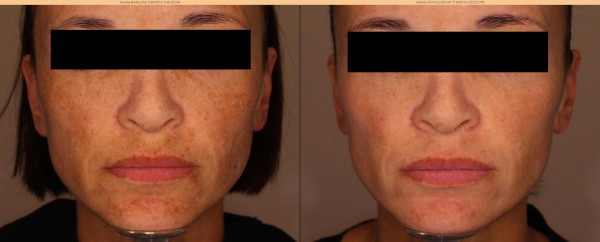What is Melasma and what causes it?
Melasma is an acquired condition of the skin causing hyperpigmentation, or brown spots, in areas of the body that have been exposed to the sun. The face is most commonly affected and melasma appears as symmetric brown patches on cheeks, forehead and chin. The brown pigment appears after exposure to the sun.
Are certain people prone to Melasma, or more likely to get it?
Melasma is caused by exposure to sunlight and can be associated with pregnancy, birth control medications, hormonal replacement therapy, thyroid disease, family history, other medications, or unknown reasons. People most commonly affected are middle-aged females. Melasma is sometimes also referred to as “the mask of pregnancy.”
What are some of the different treatment options?
There are a variety of treatment options for Melasma including sunscreen, topical regimen, oral supplements, prescription medications, laser treatments and chemical peels.
Sunscreen should be applied daily, and reapplied every 2 hours while outside. (You should look for sunscreens that are at least SPF 30 or greater, containing titanium dioxide and/or zinc oxide, and are broad spectrum.)
In addition to sunscreen while outside, sunglasses and wide brim hats should be worn for better sun protection. Sun exposure causes the melasma, so the better you can protect your skin from the sun, the better controlled your melasma will be!
A basic topical regimen for melasma includes Vitamin C, and sunscreen in the morning and retinoids at night. Your health care provider can also recommend adding a combination topical regimen treatment that includes a lightening cream.
Oral supplements can also aid in sun protection. One example is SunISDIN, a once-a-day supplement that contains a mixture of antioxidants, vitamins and essential minerals to help further protect your skin. Please note, this does NOT replace sunscreen use!
Prescribed oral medication can also help reduce melasma in some cases.
In order to best treat melasma, a multimodality approach combining the previously mentioned treatment options is usually recommended.
Describe the treatments, what they do and anything a patient might consider (ie: lasers are great but aren’t permanent)
No treatment, laser or chemical peel, is permanent. The treatments help to reduce the pigment, and the patient must maintain a good skin care routine to maintain results from the treatment.
Laser treatments are slow and steady to break up the pigment and are NOT a one-time, fix-all treatment. In order to reduce the pigment, a series of laser treatments every week to two weeks. A patient should expect at least 6-10 treatments for best results.
What’s your number one tip?
Sunscreen and sun protection are number one! EltaMD is a great sunscreen option. https://carolinaskin.3dcartstores.com/EltaMD%C2%AE-UV-Clear-Broad-Spectrum-SPF-46_p_223.html. This sunscreen is spf 46, broad spectrum, and contains zinc oxide.
If you feel you have melasma, schedule a consultation to understand the best skin care regimen, options for medications and procedure treatments.
Can you “cure” Melasma/Why is it so hard to treat?
Unfortunately, we cannot “cure” melasma. The hyperpigmentation is a result of a combination of hormonal, genetic, and medication factors. It is so hard to treat because of sun exposure and strict sun avoidance can be difficult. Melasma tends to be worse in warmer months when we are outside more, such as in the spring or summer. Melasma may disappear over time after pregnancy or stopping hormonal birth control.

Left, before treatment; Right, after.
Any new or innovative treatments that excite you or that you are watching?
Enlighten Rx is a new, prescription-level chemical peel designed to be one to two treatments, depending on the severity of pigment. This treatment consists of a mask applied in the office by a medical professional. Then a skin care depigmentation regimen is applied at home over the next 4 weeks post treatment.
Final words of advice to someone wanting to address their Melasma?
In-office procedure treatments are only one part to reducing and controlling melasma. What you do outside of the office is just as, if not more, important than what treatment options we can offer you in the office. A good daily skin care routine and sun protection/avoidance are the best way to control your melasma!

